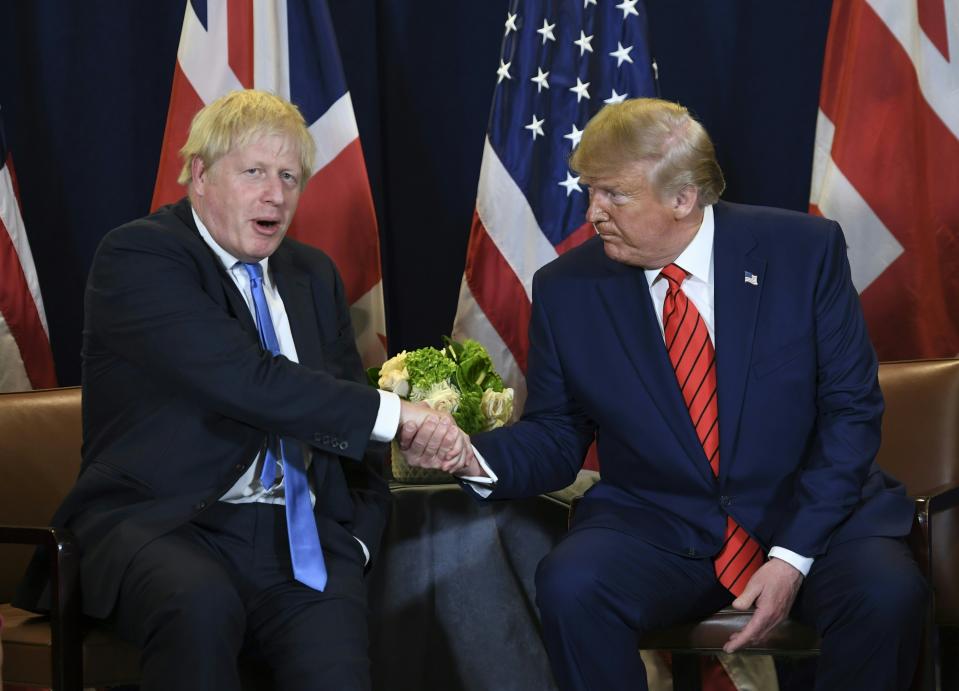How new Brexit deal could hit UK economy, wages and public spending

UK trade with Europe could plummet by 25% under the kind of EU free trade deal planned by Boris Johnson, according to the British government’s own figures.
New trade barriers could wipe 4.9% off long-term economic growth, leave real wages 6.4% lower and see borrowing soar by at least £72bn just to maintain spending than if Britain remained in the EU.
Analysis by Yahoo Finance UK of official forecasts released last year suggests the UK prime minister’s Brexit proposals could also leave the UK worse off than under his predecessor Theresa May’s plans.
The government is under pressure from backbench MPs to confirm the figures are a valid reflection of Johnson’s proposals, or to swiftly update them before parliament votes on Saturday.
READ MORE: MPs demand Johnson come clean on Brexit hit to the UK economy
The figures predict greater freedom in striking trade deals outside Europe, one of Johnson’s key objectives, will add just 0.1% to growth over the next 15 years.
It indicates the benefits of such trade deals are likely to be far outweighed by the damage from tougher terms of trade between Britain and Europe in years to come.
The sectors hit hardest by a Johnson-style free trade deal
The negative impact is envisaged across many sectors of the economy and every region of the UK, with the north-east expected to be hit hardest.
Manufacturing, particularly pharmaceutical and car exports, could be battered the hardest, with the sector’s ‘gross value added’ (GVA) predicted to be 8% lower than if current trade rules continued.
The agri-food industry and financial services could take a 7% hit to GVA, while the UK’s dominant services sector could contribute 5% less to national growth.
The economic harm largely reflects increased barriers to business between Britain and EU countries, such as increased paperwork, checks and costs to ensure goods or services meet EU or UK standards, customs rules.
READ MORE: ‘We’ve been here before’: UK firms give deal a cautious welcome
A key difference with former prime minister Theresa May’s plans is the likelihood of new ‘rules of origin’ checks, forcing companies to prove where products and their parts have come from to avoid extra taxes.
“Higher trade barriers between countries would be expected to raise the cost of exports and imports and incentivise a focus on the domestic market,” officials noted.
But the report still said the economy would continue to grow in the long run under any Brexit scenario including a no-deal outcome.
Government under pressure to reveal latest Brexit analysis
The figures were included in the ‘EU Exit: long-term economic analysis’ briefing published under May’s government in November last year.
They estimate what the impact would be of a “hypothetical free trade agreement (FTA),” reflecting average FTA non-tariff costs such as being outside the EU customs union, regulatory barriers and other changes.
While May’s deal with Brussels pledged “as close as possible” trade terms with the EU on goods, Johnson pledged a looser “free trade agreement.”
A leading backbench MP wrote to the UK chancellor Sajid Javid on Friday urging him to confirm whether Johnson’s deal could therefore be fairly compared to the “hypothetical FTA” outlined in the earlier Brexit assessment.
Catherine McKinnell, a Labour MP and chair of the Treasury select committee, called on officials to immediately update the assessment if the Treasury no longer stood by the analysis ahead of parliament’s crunch vote this weekend.
She said the committee had asked for an update three months ago but still received no response.
Trade-offs between EU trade and deals with other countries

Simon French, chief economist at stockbroker Panmure Gordon, said revised estimates would be unlikely to significantly change the headline figure on its negative impact on GDP, saying it would still be “in the ballpark” of 4.9%.
But he said a fresher analysis by officials would be far more useful in revealing the likely trade-offs between a closer deal with the EU and greater “wiggle room” to secure better terms with other countries.
“We were told, and it’s right, that there are advantages to changing our regulatory system and doing trade with the rest of the world. But it comes at the cost of the depth and breadth of any FTA with Europe going forward,” he said.
“Will it allow EU fishing access to our waters in return for UK drug exports, say? What are the costs and benefits of having deep [EU] alignment or a third-country relationship?”
READ MORE: Pound hovers at five-month highs ahead of key Brexit vote
Talks on an EU trade deal have not even started
French said the past few years of divorce talks had revealed “almost nothing about the end state” of Britain’s future trading relationship with the EU, which will be negotiated during a post-Brexit transition period.
He also questioned Labour, other opposition parties’ and think tank warnings of a “race to the bottom” on workers’ rights, environmental standards and consumer protection under Johnson’s plans.
The IPPR think tank had said on Thursday the deal “opens the door to a decade of deregulation,” putting high regulatory standards and the NHS at risk in trade talks with US president Donald Trump’s administration.
But French said: “This deal provides the chance to take a different stance, but it doesn’t mean they will.”
He noted the EU could still insist on Britain accepting EU standards at a later date in exchange for a closer relationship.
A government spokesman said: “We will negotiate a comprehensive and ambitious FTA with the EU, which will be good for our economy and businesses.
“This stage of the negotiations has focussed on the withdrawal agreement rather than the future trade deal, the specific nature of which will be subject to the outcome of the next phase of negotiation.
“We will keep parliament updated throughout the negotiations, including providing analysis at appropriate times.”

